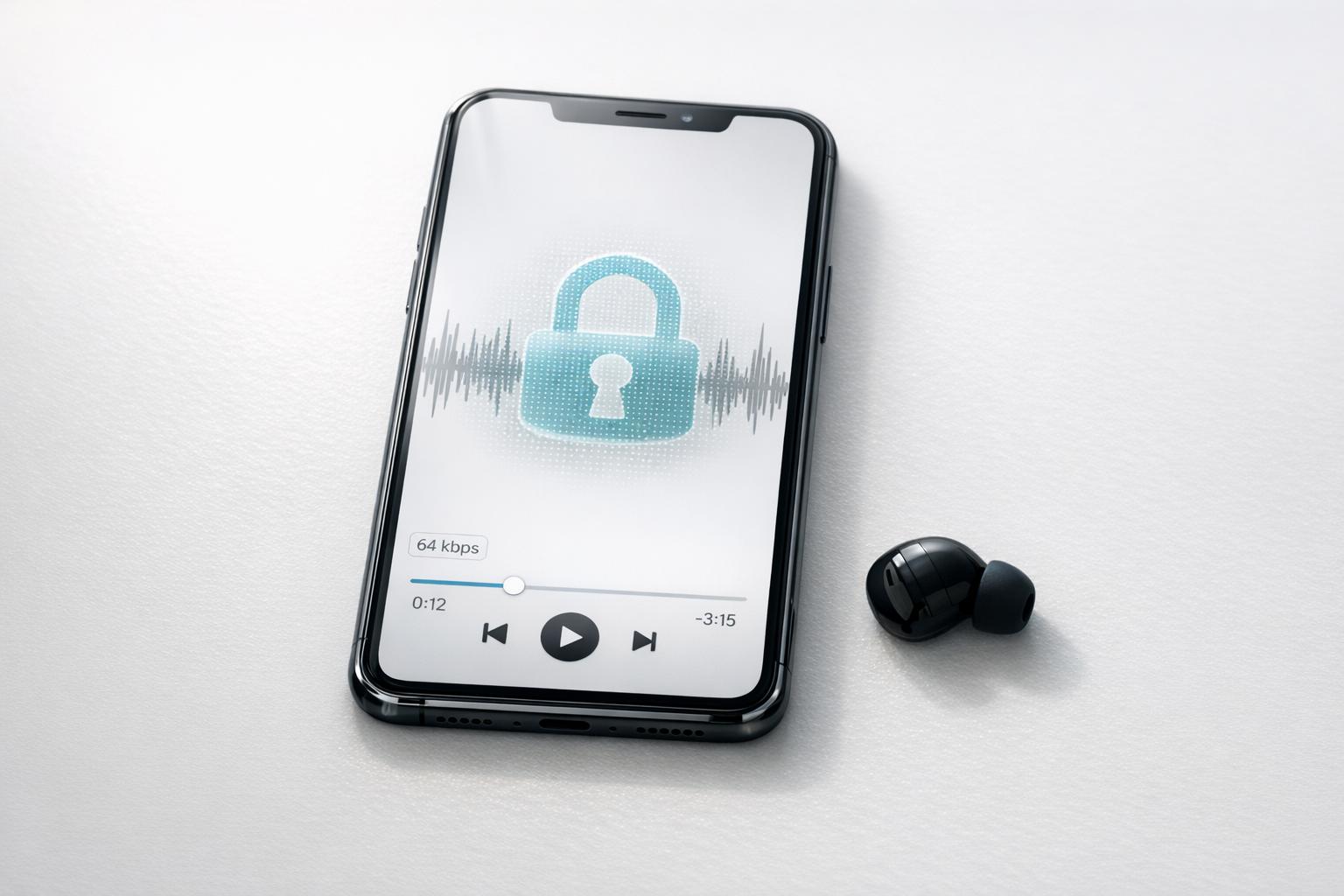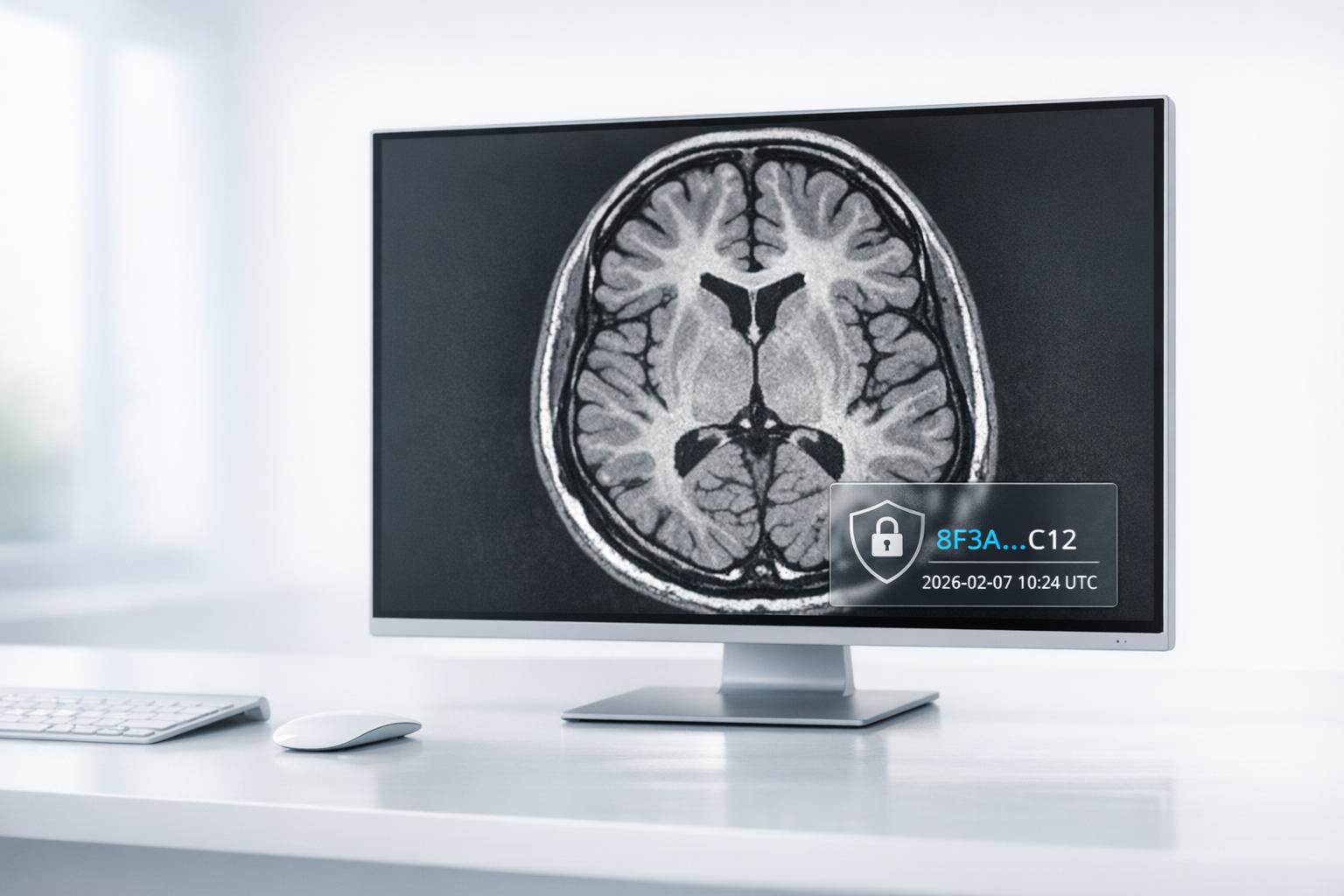Digital asset platforms in 2025 must meet rigorous certification standards to ensure security, regulatory compliance, and trustworthiness. These certifications address the growing complexity of global regulations and the increasing adoption of digital assets by financial institutions. Here’s a quick overview of the top certifications shaping the industry:
- CFTC Digital Commodity Product Certification: Regulates digital commodities like cryptocurrencies and stablecoins under the Commodity Futures Trading Commission.
- SEC Certification of Decentralization: Focuses on proving blockchain decentralization to classify assets as digital commodities.
- ISO/TC 307 Standards: International standards for blockchain interoperability, security, and governance.
- FATF Travel Rule Compliance: Enforces anti-money laundering measures for virtual asset transfers.
- AICPA SOC Certification: Evaluates internal controls and security measures for service organizations.
- ISAE 3402 Certification: Reviews operational controls over time for global credibility.
- ScoreDetect Blockchain Timestamping: Protects and verifies digital content using blockchain technology.
These certifications not only ensure compliance with regulatory requirements but also build trust among users and investors. Platforms that prioritize certification gain a competitive edge by streamlining cross-border operations, enhancing security, and aligning with global standards.
CryptoCurrency Security Standard Explained
1. Commodity Futures Trading Commission (CFTC) Digital Commodity Product Certification
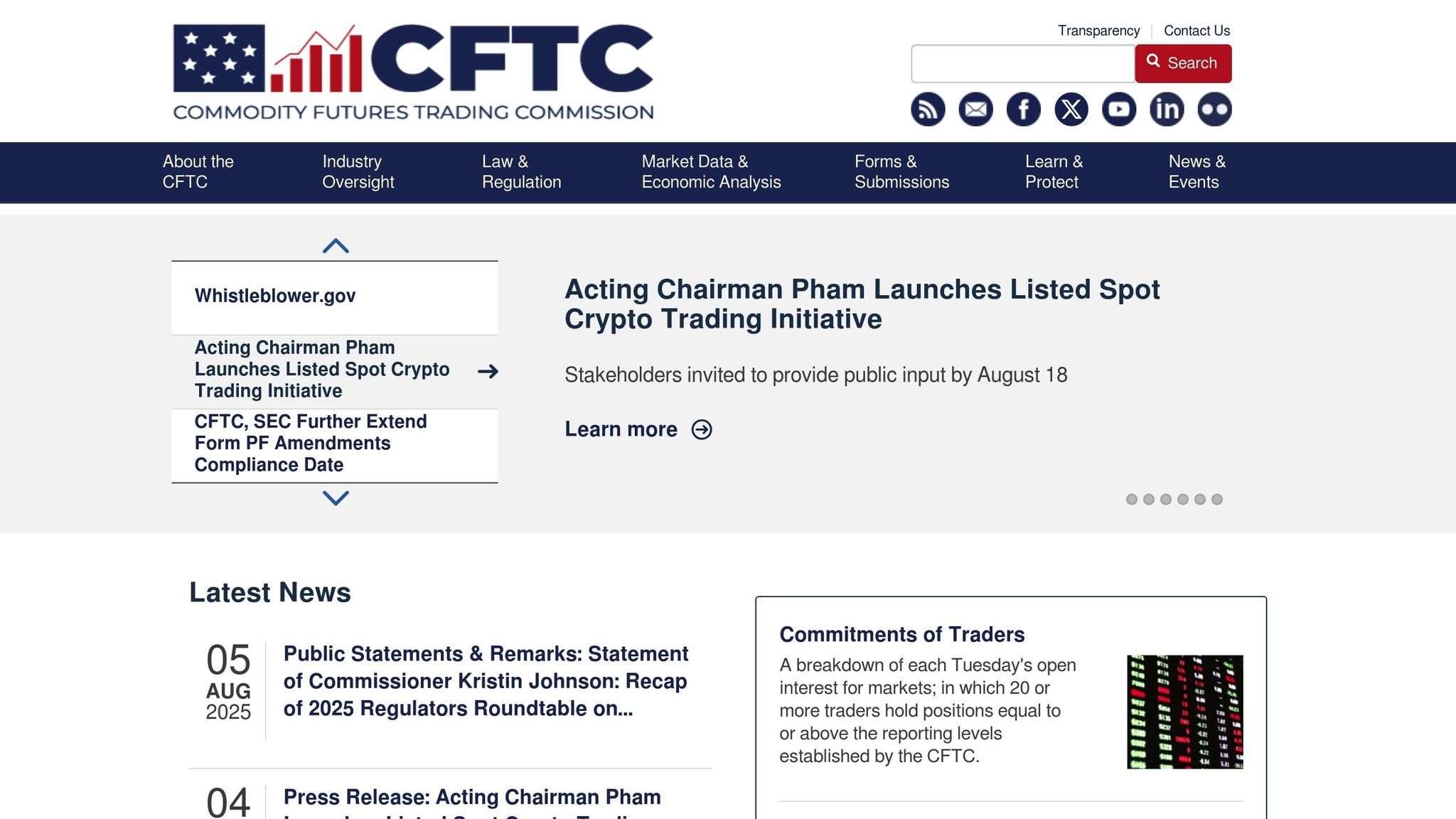
The Commodity Futures Trading Commission (CFTC) has established itself as a key player in regulating digital assets, especially after the 2025 Clarity Act. Under this act, the CFTC holds exclusive authority over digital commodities – including exchanges, brokers, and dealers – except when these assets are handled by entities registered with the SEC[4].
The agency takes a thorough approach to evaluating digital assets, determining whether they should be classified as commodities, swaps, or other derivatives[2]. This careful assessment lays the groundwork for the detailed compliance requirements outlined in this guide.
"The CFTC is wasting no time in fulfilling President Trump’s vision to make America the crypto capital of the world. We will work closely with SEC Chairman Paul Atkins and Commissioner Hester Peirce to achieve Project Crypto. Providing regulatory clarity now and fostering innovation in digital asset markets will deliver on the Administration’s promise to usher in a Golden Age of Crypto." – Acting Chairman Caroline D. Pham[3]
Regulatory Compliance Requirements
To achieve certification, digital asset platforms must meet strict business conduct standards and implement robust anti-fraud measures[4]. These platforms are also required to classify their assets accurately and prepare for rigorous disclosure and auditing processes, all of which reflect the CFTC’s dedication to maintaining market integrity[1][2].
Scope of Certification
The framework introduces the concept of a "mature blockchain system", which refers to a blockchain operating independently of any centralized controlling entity. Platforms certified as mature blockchain systems may benefit from reduced disclosure requirements, easing some compliance burdens[4].
The CFTC also collaborates with the SEC to oversee "permitted payment stablecoins", creating a shared regulatory structure that addresses the unique qualities of various digital commodities[4].
Support for Blockchain and Digital Asset Technologies
The CFTC’s framework aims to encourage responsible growth in the digital commodities sector while acknowledging the transformative capabilities of blockchain and distributed ledger technologies. For example, Bitcoin remains classified as a commodity under the CFTC’s 2015 determination[2]. This established precedent not only provides clarity for platforms dealing with well-known cryptocurrencies but also opens doors for newer digital commodities to gain regulatory approval.
Cross-Border Recognition
To align with global standards, the certification process includes an alternative compliance option for international entities. Under this model, foreign swap dealers and major participants can follow their home country’s regulations if the CFTC finds those regulations to be comparable and comprehensive[5]. This approach supports global operations for certified platforms while ensuring consistent regulatory practices.
In addition, the CFTC actively works with foreign regulators through Memoranda of Understanding (MOUs) to enhance cooperation and information sharing. Agreements with entities like the UK’s Financial Conduct Authority highlight the CFTC’s commitment to fostering cross-border regulatory alignment[5][6].
2. Securities and Exchange Commission (SEC) Certification of Decentralization
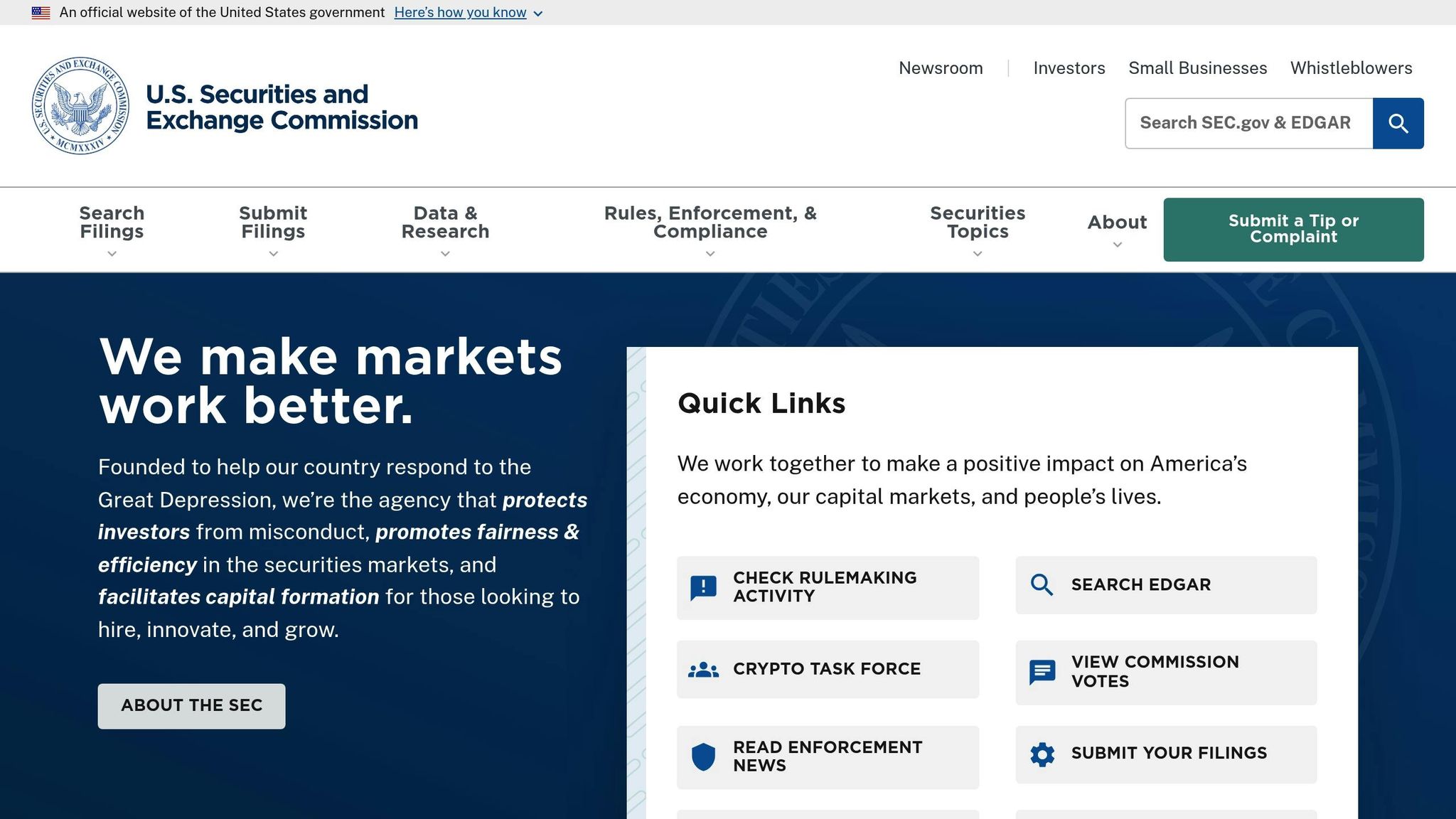
The Securities and Exchange Commission (SEC) has introduced the Certification of Decentralization process through the Digital Asset Market CLARITY Act. This initiative shifts regulatory oversight of certain digital assets from the SEC to the Commodity Futures Trading Commission (CFTC). By establishing this framework, the Act aims to clarify the boundaries of regulatory authority while aligning with global efforts to regulate digital assets.
"Time and again, we have heard the calls for regulatory clarity and certainty in this ecosystem" – GT Thompson (R-PA)[7]
At the heart of this process is the requirement to prove that a blockchain network operates without centralized control. Once certified, digital assets gain a rebuttable presumption of being classified as digital commodities[8].
Regulatory Compliance Requirements
For digital asset platforms, achieving certification involves demonstrating decentralization across governance, token distribution, and development control[8]. The SEC provides a Decentralization Metrics Guide to help developers meet these criteria[8]. Platforms that meet the decentralization standards can earn the status of a "mature blockchain system" within four years[10]. A critical part of this process is the maturity test, which evaluates whether a blockchain operates independently of any single entity or coordinated group[9].
Scope of Certification
This certification applies to digital assets that can prove decentralization in governance, technological development, and economic distribution. The CLARITY Act defines a digital asset as an electronic asset recorded on a cryptographically secured ledger[8]. This specific definition ensures that only assets meeting decentralization standards are eligible for certification. However, payment stablecoins are excluded from this framework and will be governed under separate regulations[8].
Support for Blockchain and Digital Asset Technologies
By setting clear decentralization benchmarks, the certification framework encourages developers to design compliant systems from the start, rather than modifying existing platforms later. This approach promotes growth within the blockchain sector.
The framework builds on prior legislative efforts, such as the Financial Innovation and Technology for the 21st Century (FIT21) Act[8], offering developers a structured regulatory path. Despite its promise, the initiative has faced criticism. SEC Chair Gary Gensler has expressed concerns that this approach could "create new regulatory gaps and undermine decades of precedent regarding the oversight of investment contracts, putting investors and capital markets at immeasurable risk"[11].
Cross-Border Recognition
The SEC’s framework also considers international standards. Over 800 foreign issuers are registered with the SEC, and organizations like IOSCO, the OECD, and the FSB collaborate on global digital asset regulatory issues[12]. The SEC evaluates whether domestic rules apply to foreign companies accessing U.S. capital markets, with some platforms qualifying for alternative compliance pathways[12].
SEC Commissioner Hester Peirce has emphasized the importance of international collaboration, noting that each jurisdiction should tailor its rules to protect its investors and markets while maintaining a competitive regulatory environment[12]. However, enforcing rules across borders remains a challenge due to jurisdictional limits and reliance on cooperation from foreign regulators. The IOSCO Multilateral Memorandum of Understanding (MMoU) addresses some of these challenges by standardizing protocols for international cooperation and information sharing[13].
3. ISO/TC 307 Standards for Blockchain and Digital Assets
The International Organization for Standardization‘s Technical Committee 307 (ISO/TC 307) has established itself as a key player in setting international standards for blockchain technology. Formed in 2016, this committee brings together 43 participating and 20 observing members to create unified guidelines that address regulatory gaps in the blockchain ecosystem [14].
ISO/TC 307 focuses on tackling challenges faced by digital asset platforms by ensuring consistency, safety, and quality in blockchain products and services. So far, the committee has published 12 standards and is actively working on 15 more. In total, 24 of these standards contribute to advancing the United Nations Sustainable Development Goals [14].
"Standardization aims to achieve uniformity, secure operations, and high quality across products, services, and processes." [15]
Regulatory Compliance Requirements
ISO/TC 307 lays out comprehensive regulatory benchmarks for digital asset platforms. These standards cover crucial areas like terminology, privacy, security, and interoperability [15]. For instance:
- ISO/TR 23244:2020 addresses privacy concerns.
- ISO/TS 23635:2022 provides governance frameworks.
Together, these standards aim to enhance investor confidence by establishing clear, reliable guidelines [15][16][17].
Scope of Certification
The committee’s work spans the entire blockchain and distributed ledger technology landscape. Specialized working groups focus on specific areas, as shown below:
| Working Group | Focus Area |
|---|---|
| WG 1 | Foundations |
| WG 2 | Security, privacy, and identity |
| WG 3 | Smart contracts and their applications |
| WG 5 | Governance |
| WG 6 | Use cases |
| WG 7 | Interoperability |
| WG 8 | Tokenization of assets |
ISO/TC 307 is also developing standards for emerging areas like NFTs and digital currencies. Additionally, the committee emphasizes the security of digital asset custodians, ensuring platforms that manage client assets meet stringent protection standards [19][21].
Cross-Border Recognition
One of the standout achievements of ISO/TC 307 is its role in bridging legal and operational differences across international borders. By improving interoperability, these standards allow blockchain platforms to function seamlessly in multiple jurisdictions [18][20]. For example, the European Commission’s $86 million investment in blockchain initiatives underscores the importance of cross-border compatibility [17].
"Interoperability is a key requirement across multiple areas of standardisation."
- Dr. Luke Riley, Head of Innovation, Quant Network [19]
In April 2025, SEEBLOCKS.eu and BlockStand co-hosted the European Blockchain Standardisation Day. This event brought together stakeholders from policy, industry, and academia to highlight how blockchain standards can drive innovation in areas like finance, digital identity, and supply chain transparency [20].
Support for Blockchain and Digital Asset Technologies
The work of ISO/TC 307 fosters smooth integration, enhanced security, and alignment across the blockchain industry. The committee collaborates with other ISO and IEC bodies, as well as external organizations, to minimize redundancies and maximize impact [18].
The World Economic Forum has recognized the transformative potential of blockchain and distributed ledger technologies, particularly in creating trust, enabling automation, and improving asset transfer efficiency in capital markets [15].
For digital asset platforms, adhering to these standards is essential for building credibility. By adopting these guidelines, platforms can strengthen global trust in digital asset certification while staying aligned with the broader regulatory framework [15].
4. Financial Action Task Force (FATF) Travel Rule Compliance Certification
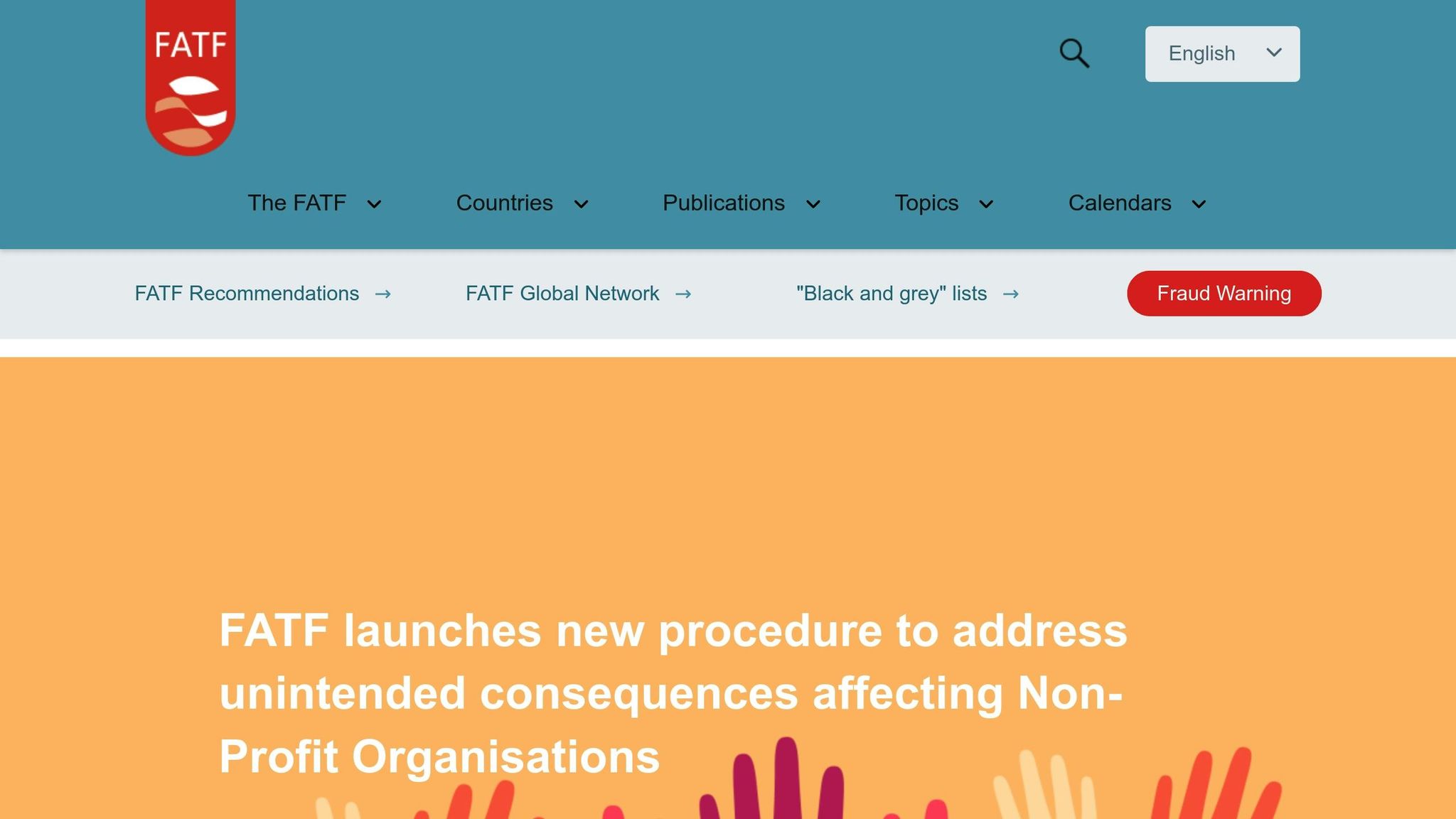
The Financial Action Task Force (FATF) Travel Rule is a key global anti-money laundering (AML) measure that directly impacts Virtual Asset Service Providers (VASPs) and traditional financial institutions [23]. This rule requires digital asset platforms to collect and share customer information during virtual asset transfers above certain thresholds, promoting greater transparency in cryptocurrency transactions.
As of the first quarter of 2025, only 46% of FATF member countries had fully incorporated the Travel Rule into their domestic regulations [23]. By June 2025, that number is expected to rise to 85% of jurisdictions [25]. This framework works alongside other global digital asset standards to improve transaction transparency.
Regulatory Compliance Requirements
The FATF Travel Rule sets strict guidelines for data sharing during virtual asset transfers. VASPs are required to collect and transmit detailed information about the sender and recipient for transactions over $1,000 (or equivalent). In some jurisdictions, this applies to all transactions, regardless of amount [22].
For the sender, platforms must gather the legal name, wallet address, identification details, and either a physical address or birthdate and location [22]. Similarly, recipient information must include the full legal name, destination wallet address, and transaction reference numbers [22].
In addition to collecting and transmitting this data, VASPs must retain transaction records for at least five years. They are also expected to verify the identities of counterparties, perform sanctions screenings, and adopt privacy-compliant protocols – such as TRISA or IVMS 101 – for secure data exchange. Compliance tools like Sanction Scanner, Notabene, Sumsub, Sygna Bridge, and 21 Analytics are widely used to simplify these regulatory processes [22].
Scope of Certification
The Travel Rule certification applies broadly to both domestic and international virtual asset transfers, especially when transactions involve financial institutions, VASPs, or multiple VASPs [22]. While peer-to-peer transfers that bypass intermediaries may not fall directly under the rule, national laws in some regions still mandate oversight of such activities [22].
Currently, FATF’s compliance table includes 67 jurisdictions, covering 98% of the global cryptocurrency market. This ensures that nearly all major digital asset activities are subject to Travel Rule oversight [25]. The certification framework extends to various providers, from cryptocurrency exchanges and wallet services to traditional banks managing virtual assets.
Cross-Border Recognition
The FATF Travel Rule establishes a global framework that supports cross-border compliance and recognition. By June 2025, 99 jurisdictions will have adopted or be in the process of adopting the Travel Rule [25]. However, challenges persist. Among the 85 jurisdictions that have enacted Travel Rule legislation, 59% have yet to issue findings, directives, or enforce compliance actions [24]. As of June 2024, 75% of jurisdictions are still either partially compliant or non-compliant with FATF standards [25]. This global alignment underscores the importance of the Travel Rule in building a unified compliance landscape.
Support for Blockchain and Digital Asset Technologies
The FATF Travel Rule lays the groundwork for responsible development in blockchain and digital asset technologies. By aligning cryptocurrency platforms with AML and counter-terrorism financing (CFT) regulations already used in traditional finance, the rule fosters trust and credibility [22]. Importantly, FATF does not mandate specific technologies for data sharing, giving companies the freedom to adopt secure, privacy-focused solutions that meet regulatory demands [22]. This flexible approach enhances interoperability across platforms and strengthens the broader blockchain ecosystem.
sbb-itb-738ac1e
5. AICPA SOC for Service Organizations Certification
The SOC 2 framework, established by the American Institute of Certified Public Accountants (AICPA), plays a critical role in ensuring robust internal controls and data protection for digital asset platforms. This certification has become a key benchmark for cryptocurrency exchanges, wallet providers, and blockchain services aiming to demonstrate their commitment to security and compliance.
The AICPA’s SOC reporting framework offers three types of reports: SOC 1, SOC 2, and SOC 3 [27]. Among these, SOC 2 stands out as the most relevant for digital asset platforms. It evaluates controls related to security, availability, processing integrity, confidentiality, and privacy – areas essential for platforms managing sensitive customer data. SOC 2 reports cater to a broad audience seeking detailed insights into a platform’s security measures [26].
Regulatory Compliance Requirements
Achieving SOC 2 certification requires adherence to the five Trust Services Criteria: security, availability, processing integrity, confidentiality, and privacy [29]. While the security criterion is mandatory for all SOC 2 examinations, the other criteria are optional and depend on the platform’s specific risks and services.
To meet these requirements, digital asset platforms must establish comprehensive security policies, deploy monitoring tools, and maintain thorough compliance documentation. The certification process includes two types of reports:
- Type I: Focuses on the design of controls at a specific point in time.
- Type II: Assesses the operating effectiveness of controls over a defined period.
Platforms begin by understanding the Trust Services Criteria (TSC) and tailoring them to their operations [29]. This involves defining the audit scope, identifying critical systems and processes, and selecting controls to address identified risks.
Scope of Certification
SOC 2 certification for digital asset platforms covers all systems and processes involved in handling customer data and delivering services. For cryptocurrency exchanges, this typically includes trading systems, wallet infrastructure, customer onboarding, and data storage mechanisms.
Platforms can choose between Type I and Type II reports depending on their needs. Type I evaluates the design of controls at a single point in time, while Type II examines their effectiveness over a period [30]. These reports enable a single provider to conduct the audit once, with the findings applicable across the organization’s client base [30].
Recognizing the unique challenges of digital asset platforms, the AICPA has also proposed criteria specifically for stablecoin operations [28][31]. These efforts align SOC standards with the increasing regulatory focus on blockchain technologies.
Cross-Border Recognition
SOC 2 certification is particularly valuable for digital asset platforms operating in global markets. It provides a universally recognized standard that demonstrates compliance with data protection requirements across multiple jurisdictions, eliminating the need for separate certifications [33]. As cloud-based services expand worldwide, SOC 2 certification helps service providers meet the diverse compliance expectations of customers in different regions [32].
"SOC 2 not only shields your customer data from lurking threats, but can even help to pull in deals by assuring customers that you manage and protect customer data." – Gcore [33]
Support for Blockchain and Digital Asset Technologies
The AICPA has adapted its SOC framework to address the complexities of blockchain and digital assets. It offers resources and training on topics like blockchain operations and virtual currency tax considerations [28][31]. Continuing professional education (CPE) programs and updated guidance help auditors and platform operators stay informed about evolving standards [28][31].
In late 2022, the AICPA introduced updated implementation guidance, particularly for privacy. This update emphasizes the distinction between data controllers and data processors, which is crucial for platforms managing customer data on behalf of other entities or integrating with third-party providers [30]. These updates ensure that SOC standards remain relevant in the fast-changing digital asset landscape.
6. ISAE 3402 Certification for Digital Asset Platforms
ISAE 3402 builds on frameworks like SOC 2 by adding an extra layer of operational scrutiny and international credibility. For digital asset platforms, achieving ISAE 3402 Type II certification is a widely recognized way to showcase operational excellence and strong control systems. Unlike one-time evaluations, this certification reviews the design and ongoing effectiveness of controls over a minimum period of six months, covering critical business functions[34].
Regulatory Compliance Requirements
To meet ISAE 3402 standards, platforms must establish and maintain controls across key operational areas such as access management, incident response, encryption, system monitoring, and change management. These controls are rigorously audited over several months to confirm their reliability and effectiveness[37]. This extended evaluation underscores the thoroughness of ISAE 3402 in assessing digital asset operations.
Scope of Certification
For digital asset platforms, ISAE 3402 certification encompasses the entire operational ecosystem that supports customer services. This includes software delivery systems, access controls, managed service infrastructures, and key management processes[34].
In April 2024, Taurus renewed its ISAE 3402 Type II certification, affirming its ability to protect against risks such as phishing, supply chain attacks, natural disasters, and insider threats.
"This certification reaffirms the effectiveness of the controls across our IT infrastructure and key management operations, which are crucial for safeguarding against risks such as phishing, supply chain attacks, natural disasters, and insider malfeasance." – Jean-Philippe Aumasson, Taurus’ CSO[34]
Similarly, Sygnum Bank earned ISAE 3402 Type II certification in September 2023 for its multi-custody platform. The certification, conducted by PwC Switzerland, validated its control measures for preventing key disclosure and loss, ensuring secure transactions, managing operations, and disaster recovery[35].
"Empowering our clients to invest in digital assets with complete trust is part of Sygnum’s mission, and our highly secure, institutional-grade custody solution plays a central role in doing so. This assurance engagement, which includes a robust set of safeguards that protect our clients’ assets from any unauthorised access, gives them complete peace of mind and enables them to focus on their investment strategies." – Thomas Brunner, Sygnum’s Head of Custody and Staking[35]
These certifications enhance trust and simplify compliance efforts on a global scale.
Cross-Border Recognition
One of the standout benefits of ISAE 3402 certification is its global recognition. For platforms operating in multiple jurisdictions, this certification eliminates the need for separate compliance efforts, reducing both regulatory hurdles and operational costs. Its worldwide acceptance reassures clients and stakeholders that the platform adheres to consistent and secure operational practices. This assurance becomes even more critical as the crypto custody market is expected to grow to $3.28 billion by 2025[36].
Addressing Digital Asset Challenges
The ISAE 3402 framework is designed to address the unique risks faced by digital asset platforms. By thoroughly evaluating internal controls in areas like information security, data management, and service delivery, the certification ensures platforms are well-equipped to handle evolving cyber threats and operational challenges.
7. ScoreDetect Blockchain Timestamping and Content Protection Certification
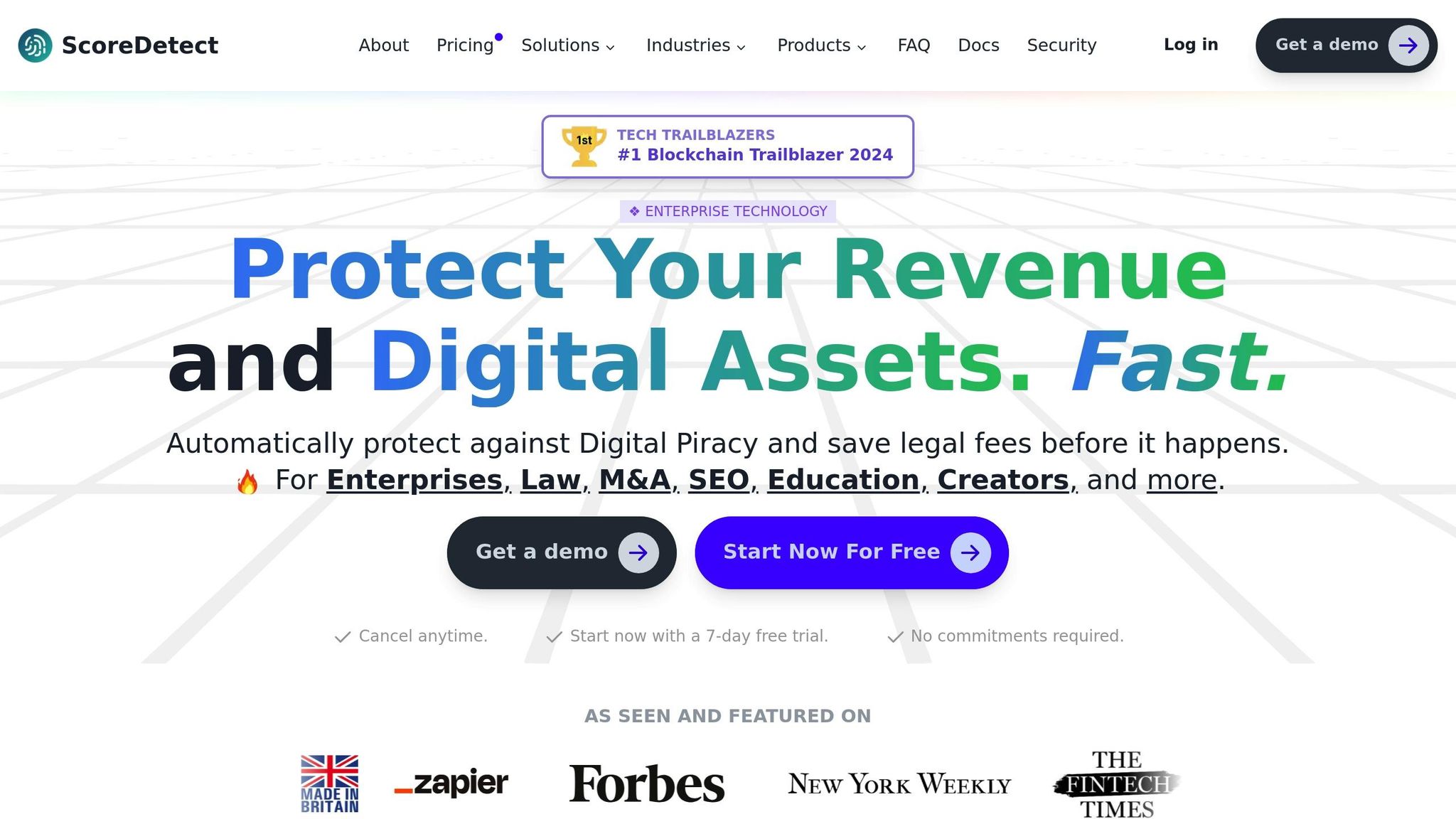
ScoreDetect’s certification ensures the ownership and integrity of digital assets by creating secure, tamper-resistant blockchain records[39]. This system combines cutting-edge technology with the need to meet regulatory standards.
Regulatory Compliance Requirements
The certification framework focuses on meeting key regulatory needs using blockchain timestamping to enhance data accuracy and reliability[39]. Applicants are required to produce traceable, unchangeable records to pass audits effectively[39]. Platforms must align with major regulations like GDPR, HIPAA, and SOX by maintaining transparent, immutable records[39]. The framework also enforces the use of standardized ISO 8601 timestamping protocols, synchronized with trusted sources for precise timekeeping. Additionally, it requires strict role-based access controls with periodic reviews to prevent unauthorized changes to audit records[38]. Automated tools powered by smart contracts streamline auditing processes, cutting down on manual efforts and associated costs while ensuring data remains intact[38][39]. This comprehensive system supports certification for a variety of asset types.
Scope of Certification
ScoreDetect’s certification covers digital content protection and management across multiple asset categories. Each certification includes critical details such as the blockchain timestamp, certificate type, version, and checksum for verification[40]. The framework operates through four key methodologies:
- Prevent: Uses invisible watermarking to protect content.
- Discover: Employs intelligent web scraping to detect unauthorized use.
- Analyze: Conducts quantitative matching for content verification.
- Take Down: Issues automated delisting notices to address copyright violations.
Cross-Border Recognition
The certification framework is designed for global compliance, utilizing blockchain’s universal verification capabilities. ScoreDetect integrates with over 6,000 web applications through Zapier, enabling seamless workflows across jurisdictions[40]. Combined with mybizz‘s compatibility with more than 2,700 business tools, this integration simplifies international certification processes[41]. Blockchain’s decentralized structure provides added security, protecting data from unauthorized access while ensuring transparency. This approach minimizes regulatory challenges and operational expenses for businesses operating worldwide.
Support for Blockchain and Digital Asset Technologies
ScoreDetect strengthens blockchain and digital asset technologies with its timestamping features. By capturing a checksum of content rather than storing the asset itself, the platform enhances copyright protection[40]. Certificates include a blockchain timestamp and public URL, with regular integrity checks to detect unauthorized changes promptly[38][41]. By merging immutable blockchain records with compliance needs, ScoreDetect offers a practical solution that helps organizations meet regulatory demands while allowing them to focus on growth without constant regulatory concerns[39].
Certification Standards Comparison Table
The rapidly changing certification landscape for digital asset platforms demands thoughtful consideration of jurisdictional rules, regulatory requirements, and specific use cases.
| Standard/Authority | Scope | Key Requirements | Jurisdiction | Recognition | Typical Use Cases |
|---|---|---|---|---|---|
| CFTC Digital Commodity Product Certification | Digital commodities trading and derivatives | Compliance with Commodity Exchange Act amendments, spot market oversight, and consumer protection measures | United States | Primary U.S. regulatory authority for digital commodities | Cryptocurrency exchanges, digital commodity trading platforms, derivatives markets |
| SEC Certification of Decentralization | Digital assets classified as securities, permitted payment stablecoins | Traditional securities disclosures focused on blockchain functionality and decentralization [42] | United States | Federal securities regulation authority | Token issuers, stablecoin providers, decentralized finance platforms |
| ISO/TC 307 Standards | Blockchain systems and digital asset infrastructure | Technical specs for blockchain interoperability, security protocols, and smart contracts | Global | Recognized in 134+ countries exploring CBDCs [46] | Blockchain developers, enterprise platforms, cross-border payment systems |
| FATF Travel Rule Compliance | Anti-money laundering for digital asset transactions | Customer identification, transaction monitoring, and cross-border reporting | Global (implemented by member countries) | Key compliance standard in regulated jurisdictions [45] | Digital asset exchanges, wallet providers, payment processors |
| AICPA SOC Certification | Internal controls and security for service organizations | Financial reporting controls, security measures, and operational processes | United States (internationally recognized) | Widely accepted by auditors and financial institutions | Custodial services, trading platforms, institutional service providers |
| ISAE 3402 Certification | Service organization controls and assurance | International auditing standards, control assessments, and risk management | International | Recognized globally, especially in Europe and Asia | International digital asset platforms, multi-jurisdictional service providers |
| ScoreDetect Blockchain Timestamping | Digital content protection and asset management | Blockchain timestamping with ISO 8601 protocols, immutable records, and automated compliance workflows | Global with 6,000+ app integrations | Cross-border recognition via universal blockchain verification | Content creators, legal firms, healthcare, finance, and government agencies |
This table highlights how different certifications meet diverse regulatory and operational needs. As the global digital asset market continues to grow, platforms must align with both local and international compliance demands.
The tokenized assets market is projected to hit $30 trillion by 2034 [46], underscoring the pressing need for certifications that bridge traditional financial regulations with blockchain-specific standards.
Jurisdiction plays a critical role in determining certification priorities. For example, U.S.-based platforms face higher regulatory uncertainty, while countries like El Salvador benefit from more defined frameworks [45]. Meanwhile, the European Union’s MiCA regulation, aimed at harmonizing rules, has inadvertently created new regulatory bottlenecks [45].
"El Salvador is leading the way in integrating digital assets into the economy while maintaining a regulatory framework supporting market stability and growth."
– Carmen Elena Ochoa de Medina, Head of El Salvador, VLRM Markets [45]
Regulators are increasingly focusing on user location rather than just company headquarters [45]. The OECD’s CARF framework sets global standards for the automatic exchange of tax information on crypto assets, while the EU’s DAC8 mandates compliance for all crypto facilitators serving EU clients [43][44].
Modern certifications stand out by integrating advanced technology to address both traditional and emerging asset types. This shift reflects the evolving needs of the digital asset ecosystem.
The comparison makes it clear: no single certification can address every regulatory and operational requirement. Many platforms opt for multiple certifications to meet the unique challenges posed by their markets and jurisdictions.
Conclusion
By 2025, digital asset platforms face a regulatory environment where certification is no longer optional but a fundamental requirement. The introduction of the CLARITY Act of 2025 has reshaped the industry, mandating that platforms submit detailed certifications to the CFTC before listing new digital assets for trading [42][47]. This shift underscores how certification has transitioned from being a competitive edge to a baseline operational necessity.
The advantages of achieving proper certification go well beyond regulatory compliance. Certified platforms enjoy tangible benefits, including 30% faster institutional onboarding and 25% fewer compliance incidents [42]. These improvements directly enhance market access, lower operational risks, and build stronger investor trust.
Certification also plays a crucial role in simplifying cross-border operations. By adhering to international standards like ISO/TC 307 and the FATF Travel Rule, platforms reduce legal complexities and expedite the onboarding of global clients [47]. This operational efficiency opens the door to advanced automation tools that make compliance even more seamless.
Blockchain-based certification solutions have emerged as a game-changer. They create immutable, verifiable records that can be instantly audited by regulators or partners, eliminating delays tied to traditional paper-based processes [42]. For instance, ScoreDetect’s blockchain timestamping technology showcases this evolution by enabling automated compliance workflows, integrating with over 6,000 apps, achieving a 96%+ takedown rate for unauthorized content, and reaching a 95% success rate in web scraping for infringement detection. These tools reduce operational burdens while delivering the real-time transparency regulators now expect [42][48].
On the flip side, platforms that neglect certification face significant challenges. They risk losing institutional investors, damaging their reputations, and encountering operational disruptions as regulatory standards grow stricter [42][47].
As certification standards continue to evolve, the trend leans toward greater automation and global alignment. To succeed in this demanding environment, digital asset platforms must prioritize robust certification strategies that blend traditional compliance with advanced blockchain-based verification. Those who act now will position themselves to thrive in a rapidly expanding digital asset market.
FAQs
What is the difference between how the CFTC and SEC regulate digital asset platforms?
The CFTC and SEC have taken distinct routes in regulating digital asset platforms as of 2025, each reflecting their specific areas of authority. The CFTC focuses on digital assets classified as commodities, overseeing both spot trading and derivatives markets under the framework of the Digital Asset Market Clarity Act of 2025. Their responsibilities include promoting transparency and preventing market manipulation in commodity-linked digital assets.
Meanwhile, the SEC concentrates on digital assets deemed securities, prioritizing investor protection and ensuring compliance with securities laws. Efforts like Project Crypto have been introduced to enhance oversight of these platforms. Together, these agencies provide a dual framework: the CFTC manages commodities, while the SEC oversees securities, creating a thorough regulatory approach for the digital asset landscape.
How do international standards like ISO/TC 307 help digital asset platforms stay compliant globally?
International standards like ISO/TC 307 serve as a global framework to help digital asset platforms meet compliance requirements worldwide. These standards emphasize crucial aspects such as security, interoperability, and privacy – essential elements for fostering trust and consistency across international markets.
By harmonizing regulatory approaches across various regions, ISO/TC 307 makes it easier to implement compliant solutions while encouraging advancements in the fast-paced digital asset space. This ensures platforms are not only secure and scalable but also prepared to tackle the demands of the future.
What is the FATF Travel Rule, and why is it important for digital asset platforms in cross-border transactions?
The FATF Travel Rule sets a worldwide standard aimed at improving transparency and accountability in cross-border digital asset transactions. This rule mandates that Virtual Asset Service Providers (VASPs) exchange specific customer information – like details about senders and recipients – during transfers. The goal? To help prevent money laundering and curb the financing of terrorism.
For digital asset platforms, adhering to the Travel Rule means aligning with international regulations while building trust within the industry. By creating a uniform approach to information sharing, it minimizes the chances of illegal activities and supports safer, more dependable global transactions.
